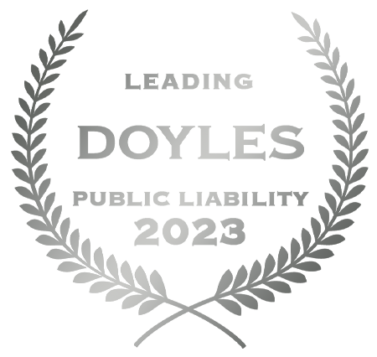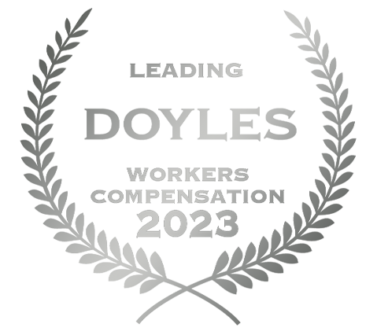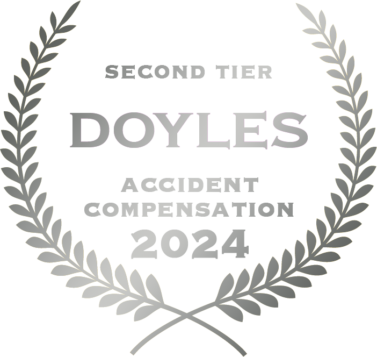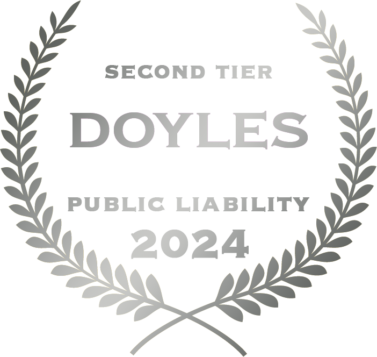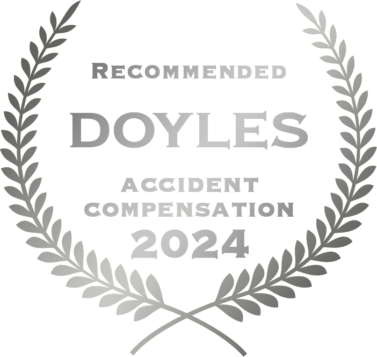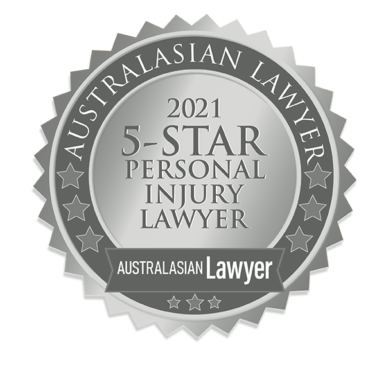
Injured at Work? Everything You Need to Know About a Workers Compensation Claim.
Many Australians have a laid-back, ‘all in a day’s work’ approach when it comes to the unusual and unexpected, but that should never extend to getting injured on the job. When a workplace injury does occur it can be hard to know what to do. Understanding the steps to take and the support you’re entitled to after an accident at work can completely alter the course of what happens next. If you’re injured at work, this overview will give you an idea of what to do so that you can access the support and compensation payments you need to get you back on track as quickly as possible.
Nobody ever plans to get injured, but if the worst happens there are many steps you can and should take to give yourself the best chance at recovery and getting your life back. You don’t have to do it alone.

What if it was my fault?
It’s easy to make a mistake – slipping over if you aren’t paying attention or throwing your back out by picking something up the wrong way. Even if you’re worried that you might be in the wrong, it’s likely that you’re still eligible to claim.
Australia operates on a no-fault workers compensation scheme, which means that if you get injured at work, you can make a claim regardless of who was at fault.
Though not essential, contacting a specialist workers compensation lawyer for free advice can be a helpful step to make sure you’re entirely aware of your options and entitlements.
So, you’ve been injured at work – here’s what to do next
Follow these steps to get the help you need and access all of your claim entitlements.
Step 1. Seek medical treatment
If the injury is urgent, seek first aid or medical treatment appropriate.
Step 2. Report the injury
If you are injured at work, you should alert the person you report directly to that something has gone wrong. Your employer should have a process in place for reporting any accidents. Once you’ve alerted them, it’s then their responsibility to inform their insurance provider of the incident within 48 hours
Step 3. Have your injuries assessed by a doctor
Your next step should then be to go to a doctor to determine the extent of the injuries and obtain a full assessment of all existing and potential injuries. This not only helps you understand what your injuries are and how to care for them, but also establishes a timeline and official account of harm sustained.
To lodge a workers compensation claim, you will need a NSW workers compensation certificate of capacity issued by a doctor. This should include:
- Your diagnosis and its relationship to employment
- Medical treatment required
- Your capacity for any work (such as how much and what type of duties you can perform)
- If a referral to a workplace rehabilitation provider is needed
- Any delays in your recovery
- Details of previous related injuries
- Expected return to work date
Step 4. Record everything
Beyond the doctor’s report, keep a record of everything that occurs. It may seem obvious at the time, but details can easily become confused, so a written record of the chain of events can prove useful down the track.
Write down exactly what happened – everything from what time the incident took place to any correspondence from your employer about the event. Include any relevant details, for example, if a hazard had been brought to your employer’s attention and no steps were taken to prevent harm.
Keep this record somewhere secure where you can access it easily. If you send it as an email to yourself then you have a time and date stamped copy as well. You never know when it will come in handy.
Step 5. Contact a workers compensation lawyer
When in doubt, speak to a professional. It’s in the insurer’s interest to pay you as little as possible, but that doesn’t have to be the end of it. If you’ve been injured on the job, seeking legal advice will give you an understanding of your full entitlements and help you find out if you can claim compensation.
Going it alone might seem like the only option, but with a specialised Personal Injury firm on your side, you are more likely to access entitlements like lump sum compensations that you didn’t even know that you were missing out on.
What constitutes a workplace injury?
Every workplace is different, and the types of workplace injuries possible are equally diverse. While NSW has a no-fault policy, it is important to understand what falls under the definition “workplace injury.”
If you’re injured while completing a task that benefits your employer, then this falls under a workplace injury. This includes any accidents at work, like if you slip and fall in the break room while having your lunch, because having you on site still benefits your employer. This generally includes the physical premises where you work like the carpark and communal areas. If you’re offsite for a work-related reason, such as visiting a client or completing a delivery, this will likely be covered as well.
Being injured while travelling to a fixed worksite (like the office) is unlikely to be covered by workers compensation. If you’re involved in an accident on your drive to work, that doesn’t fall under the responsibility of your employer. However, if you’re driving a company car to meet a client and are involved in an accident then you will be covered.
What are the most common work injury claims?
A workplace injury is harm or pain caused by carrying out a task that your employer expects you to do. This includes injuries from lifting heavy items, slipping over on a hazard that hasn’t been removed like an oil spill, or strain caused by repetitive movements like packing boxes.
Injuries can be caused simply by doing the job, or an unexpected accident at work that causes a problem, like being struck by a falling object. Common workplace injuries include:
- musculoskeletal disorders (sprain/strain, chronic joint/muscle conditions)
- wounds and cuts
- burns
- fractures and breaks
- psychological injuries
Between 2018 and 2019, 87% of workers compensation claims were for musculoskeletal disorders, with 40% of these claims specifically related to joint, ligament, muscle and tendon injuries*.
Technicians, trade workers, and community and personal service workers were most at risk of sustaining a work-related injury or illness**.
*Safe Work Australia
**Australian Bureau of Statistics
If you’re not sure where to start with a workplace injury claim, you can call 13 15 15 and get free legal advice. And if you’re entitled to compensation, Law Partners can fund all the medical reports needed to support your work injury claim.
Can I claim a mental or psychological injury?
Psychological injuries sustained at work can be far less simple than physical injuries, though no less significant. It can be difficult to prove that a psychological injury was caused directly by work. Injuries can include depression, post-traumatic stress disorder (PTSD), and anxiety.
Sometimes mental injuries occur from a direct source, such as bullying, harassment, job insecurity, or shift work (which can cause just as much psychological harm as physical). They can also develop as secondary injuries as a result of a physical injury. These additional factors can make it difficult to approach and seek compensation, but the right lawyer will be able to assist with building a case.
Injured while working from home?
Working from home skyrocketed during the pandemic and has endured due to benefits like less time commuting, flexible working arrangements, and the ability to spend an entire workday in your Ugg boots. But working from home is just that: working. So, you’re still covered by workers compensation if you’re injured while working from home.
The steps are the same – notify your employer, seek medical treatment, see a doctor, keep records, and seek advice from a workers compensation lawyer to make sure you understand and can access your full entitlements.
Call 13 15 15 or chat to us now for free advice
Chat nowFind out how much you can claim.
Get startedHow much can you claim when injured at work?
When you’re injured, the priority is getting back to normal as quickly as possible. Money can’t fix all injuries, but compensation can relieve financial stress to cover lost wages and treatment expenses to take some of the pressure off.
The amount that you’re entitled to is dependent on the level of Whole Person Impairment (WPI). For impairments equal to or greater than 11%, proportional compensation ranges from the tens to the hundreds of thousands* of dollars.
For a more personal appraisal, contact us for a free consultation.
Here’s how your worker’s injury compensation would be calculated:
*According to SIRA Open Data, April 2022.
| Degree of permanent impairment | Compensation range |
|---|---|
| 0 – 10% | $0 |
| 11% – 20% | $22,480 – $53,970 |
| 21% – 30% | $51,880 – $86,370 |
| 31% – 40% | $83,040 – $139,760 |
| 41% – 50% | $131,440 – $193,160 |
| 51% – 60% | $242,010 – $341,270 |
| 61% – 70% | $376,030 – $489,280 |
| 71% – 74% | $510,040 – 563,270 |
| 75% – 100% | $577,050 – $637,290 |
Estimating your total payout for a work injury isn’t straightforward and depends on your individual circumstances. You can get free legal advice by calling 13 15 15 and speaking to one of our specialist workers compensation lawyers.
How do I get the most out of my workers compensation?
Making a claim for compensation to cover time off or treatment expenses due to an injury at work can be done through several steps. These aren’t all encompassing, but they’re a great place to start:
- Report your injury to your manager.
- Obtain a medical certificate of capacity from your doctor.
- Your employer has 48 hours to report your injury to their insurer – you can contact the insurer to make sure this has occurred.
- The insurer will contact you to arrange an assessment of your injuries and notify you whether they will accept liability for your claim.
- If they deny your claim, or you disagree with their decision, seek legal advice to explore what other avenues are available to you.
If you’re not sure where to start, call us on 13 15 15 to receive free, personal advice from a specialist workers compensation lawyer.
How can I get help claiming workers compensation?
At Law Partners we have teams who specialise in each individual area of personal injury, so whatever you’re dealing with, we have someone who can help. Our lawyers win 99% of their cases and you can access free, personal advice – without any commitment. If you have any questions about claiming workers compensation, you can call us on 13 15 15, or submit an enquiry online. We have offices around Sydney, including Newcastle and Parramatta, as well as Melbourne ready to help.

Chantille Khoury
Principal
Chantille is a multi-award-winning, preeminent workers compensation specialist with over 20 years’ experience. Having ranked top 6 nationwide in the highest category of the Doyle’s Guide, Chantille is now providing feedback on policy changes for the Personal Injury Commission and government bodies.
Related articles.
Do I have a case?
Our senior lawyers will assess your case for free.



